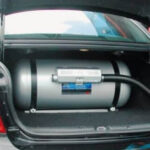The fact that President Tinubu is prepared to make some big and important economic decisions is one thing that became abundantly obvious in Week One. He took on the petrol subsidy issue that was hanging over Nigeria’s head from Eagle Square. He deviated from what he had planned to say and said that the “petrol subsidy is gone.”
From that moment, the music changed on the street. Petrol stations hurriedly shut down, queues built up rapidly across the country and off course prices went off the roof. That is all that most people will remember of the president’s inaugural speech.
In the days that followed, the Nigerian National Petroleum Company (NNPC) Limited, working with the Nigerian Midstream and Downstream Petroleum Regulatory Authority (NMDPRA) released a new template, which saw the price of a liter shoot to N448 per liter in Lagos to N537 in Abuja and even more up North.
This has not come without opposition by the Trade Union Congress and the Nigeria Labour Congress, with a strike action waiting to happen.
But, Waziri Adio, a renowned journalist and policy strategist in his intervention said: “Maybe many did not pay adequate attention but he had, during the campaigns, given enough notice about his determination to end the ruinous and deficient yet politically sensitive petrol subsidy scheme.”
Subsidy background
The Nigerian economy has been subsidised in various ways for many years through petroleum products, education, electricity, forex etc.
Fuel subsidy began in the 1970s. It became institutionalised in 1977 following the promulgation of the Price Control Act, which made it illegal for some products, including petrol, to be sold above the regulated prices.
While the concept of subsidy itself is noble, its administration in Nigeria has been plagued with serious allegations of corruption and mismanagement.
Thirteen years after diesel was deregulated, kerosene subsidy was removed in 2016. However, the subsidy on petrol has proven to be the biggest challenge to the managers of the Nigerian economy.
On an annual basis, a substantial portion of the national inflow is committed to funding the subsidy scheme. That figure has continued to rise astronomically due in part to the international price of crude, volume of petrol consumed, albeit debatable, and naira devaluation.
Unsustainable financial cost of subsidy
According to the World Bank, Nigeria’s total revenue in 2000 was USD10.8billion. By 2010, this amount increased to USD 67.9bn, yet the Nigerian government has spent over USD30bn on fuel subsidies over the past 18 years. This has had a significant impact on funds available for critical infrastructure and other essential sectors, such as education, health, and defence.
Also, according to the Debt Management Office, the country’s public debt stock is being increased as the government had to borrow N1trillion to finance fuel subsidy in 2022.
Economic distortion
According to a report, households in the bottom of 40 per cent of the income distribution account for less than 3 per cent of all fuel purchases. Furthermore, it is reported that three-quarter of all fuel sold in Nigeria is consumed by private firms, public transportation services, government agencies and other businesses.
Most vehicles used for carrying large numbers of people (such as molue) and goods are diesel-powered, which is already deregulated. Also, household kerosene, which is mostly used by the poor, is no longer subsidised, meaning that the poor are already, to a large extent, paying market prices for their fuel.
This means that the government was subsidising mostly those who could afford petrol at market rates and not the poorest of the poor who need subsidy. This is one of the major problems with the way fuel subsidy was implemented in Nigeria.
Smuggling
The porous borders between Nigeria and neighbouring countries have created an enterprise for smugglers, who purchase large volumes of petrol at a subsidised rate in Nigeria and sell at market prices in neighbouring countries.
In June 2022, the managing director of the NNPC Limited indicated that daily consumption of petrol had increased to over 103million litres per day, and that at least 58million litres were being smuggled.
This means that smugglers and other West African countries benefitted more from fuel subsidy than Nigerians.
A report published by Chapel Hill Denham estimates that 15.64 million litres of petrol are smuggled out of Nigeria daily as the retail price of Nigerian petroleum products on average is 3.7 times cheaper than those of its neighbours, and this has given smugglers undue opportunities for arbitrage.
Investment
Nearly 70 years after the discovery of crude oil in commercial quantity in Nigeria, the country’s oil and gas downstream sector is yet to develop to the desired levels despite the recent enactment of the Petroleum Industry Act (PIA). The downstream sector of the oil and gas industry had the least foreign direct investment compared to the midstream and upstream sectors, and the reason for this is not far-fetched. The current subsidy regime and the legal framework of the downstream sector generally discourage investments.
Relationship between petrol price increases, inflation and cost of living
According to a report by the Price Water Coopers in Nigeria (PWC) titled Fuel Subsidy in Nigeria – Issues, Challenges and the Way Forward, the price of petrol is considered as a major driver of the cost of living as it is used by all, including small businesses and many households, given the unstable electricity supply. Therefore, any increase in fuel price could directly and immediately impact the prices of goods and services across the country.
The report also posits that there is the psychological impact it tends to have because of the strong sentiment attached to cheap and affordable petrol. When petrol prices increase, small businesses tend to raise their prices to cover the increased cost of operation, which can lead to higher prices for consumers. This can make it more difficult for people to afford basic necessities, leading to a decrease in the standard of living and contribute to poverty and inequality.
The report noted that while petrol price deregulation could contribute to higher costs of living and inflation, the impact could be moderated if complemented with effective policies and well thought out implementation strategy.
Will local refining bring succour?
Local refining of crude oil could potentially eliminate the need for petrol subsidies altogether or make the market price affordable. Currently, Nigeria imports its refined petroleum products due to limited or no domestic refining.
Local refining is, therefore, expected to reduce Nigeria’s dependence on imports and potentially stabilise petrol prices. However, the report noted that instead of cost of haulage, insurance and associated cost of importation, the pump price without subsidy would still be higher than the regulated price, unless the international price of crude oil falls below a certain level.
While local refining will provide a price cushion, it is not a silver bullet that would magically solve the subsidy problem.
However, the Group Chief Executive Officer of the NNPC Limited, Mele Kyari, has repeatedly assured that the present high cost of petrol will crash in no distant time, allaying the fears of Nigerians about the development.
The NNPC boss said competition among major players in the oil sector would force down the price of the product against the upward trends that had caused panic in the country. He said the removal of the subsidy would ensure healthy competition, which would ultimately lead to a downward review of pump prices of petrol across the country.
What is, however, certain, going forward, is the position of the NMDPRA, which is that the price of petrol would be determined by market forces, ushering in a new era of unregulated pricing in the Nigerian oil market.
Farouk Ahmed, the head of the regulatory agency said, “The market structure will dictate the price swings at every point in time.”
Ahmed explained that the NMDPRA would no longer fix prices or release templates for petrol although the agency would team up with the federal government and the Consumer Protection Commission to monitor the market to prevent profiteering by petroleum marketers.
Are palliatives effective?
Fuel subsidy in Nigeria has been fraught with issues of corruption and inefficiency, and palliatives have been suggested by some as a possible way to alleviate the suffering of those that would be most affected by subsidy removal.
However, Nigerians have also expressed concern that while palliatives can provide some relief to vulnerable households, it is difficult to identify and sufficiently cover the vulnerable population that will be most impacted, especially given lack of reliable demographic data.
The PwC report noted that, “In reality, palliatives can be expensive, yet ineffective, in addition to their being prone to corruption.
It argued that, “A multifaceted approach that involves evidence-based identification of the most vulnerable population and a robust palliative administration with in-built controls would provide a more sustainable and long-term solution.”
Nigerian will eagerly await answers to some posers by Adio, which are, “Will the president hold steady or will he wilt under pressure, concede grounds as others before him had done, and also just kick the can down the road? Two, what is his strategy to take this beyond just price adjustment to full, proper and competitive deregulation of the downstream sector? And three, what and where is his plan for relieving the expected pains from petrol subsidy removal and for repurposing some or all of the savings/gains?

 Join Daily Trust WhatsApp Community For Quick Access To News and Happenings Around You.
Join Daily Trust WhatsApp Community For Quick Access To News and Happenings Around You.


